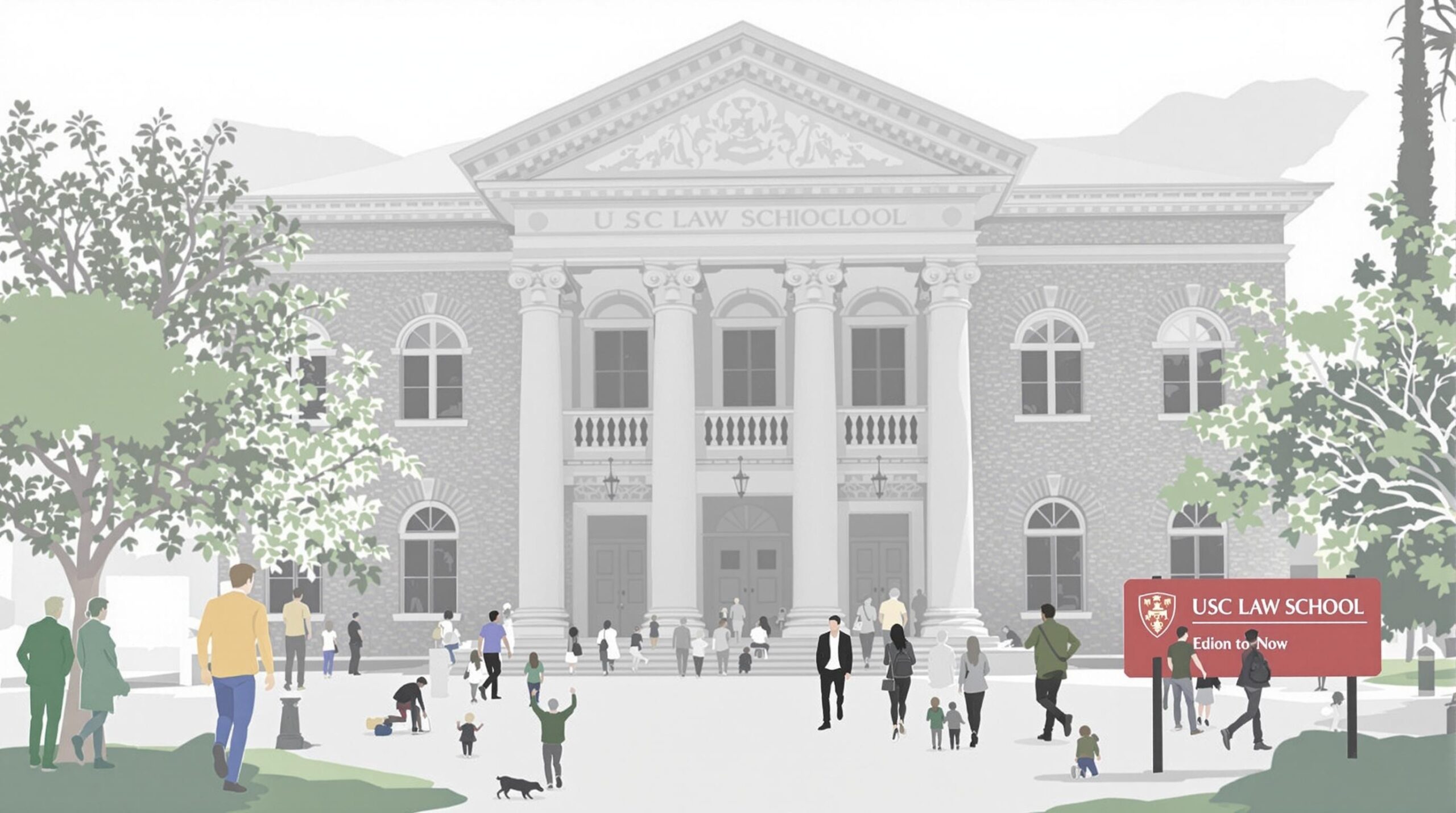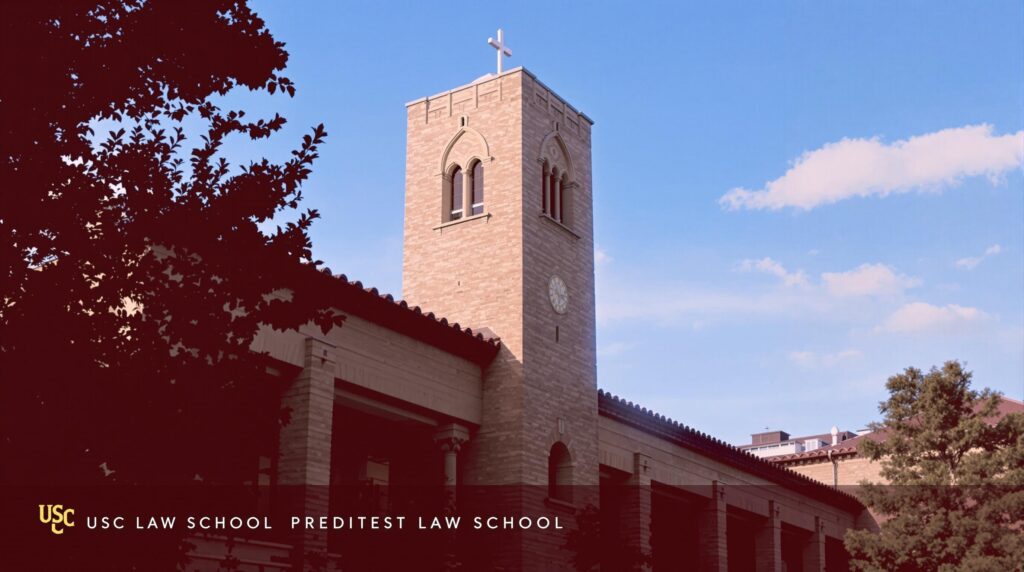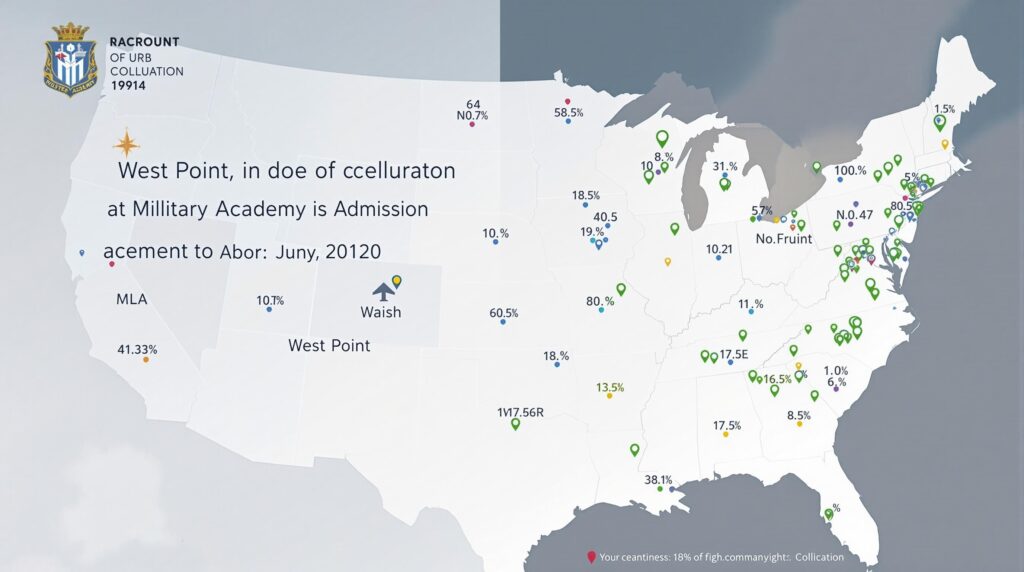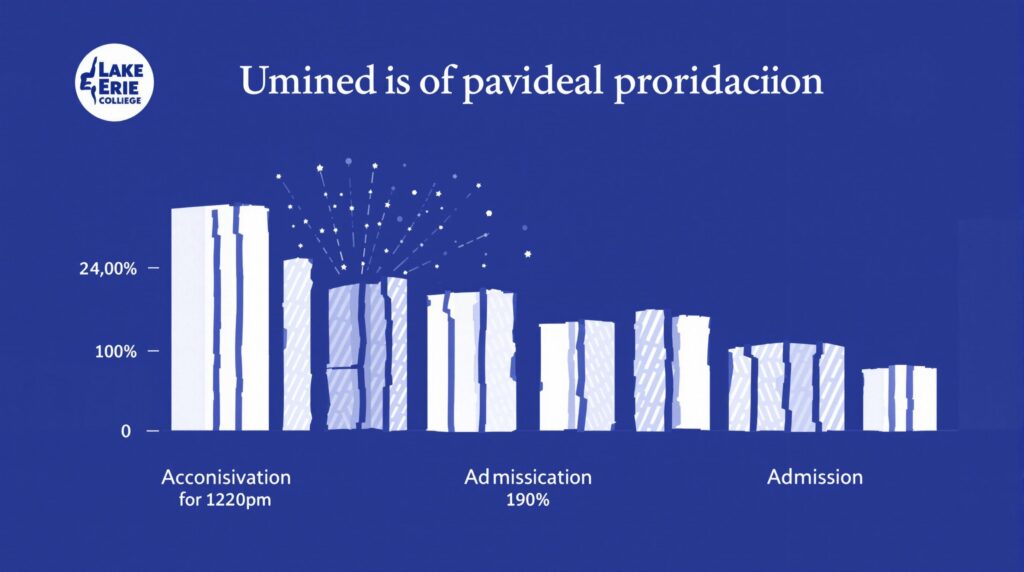The USC Gould School of Law boasts a competitive acceptance rate of approximately 20%, making it a sought-after institution for aspiring legal professionals. With its prestigious reputation, strong employment outcomes, and location in Los Angeles, USC Law attracts high-caliber applicants who must navigate a selective admissions process requiring exceptional academic credentials and compelling personal statements.
Key Takeaways
- USC Law’s acceptance rate of 20% places it among the more selective law schools in the United States
- Successful applicants typically have median LSAT scores around 167 and GPAs of 3.78
- The school values diverse backgrounds and experiences in addition to academic excellence
- USC Law graduates enjoy high bar passage rates and strong employment prospects
- The cost of attendance is substantial, but scholarship opportunities are available for qualified applicants
Understanding the USC Law School Acceptance Rate
Getting into USC Gould School of Law presents a significant challenge for prospective law students. The school maintains a competitive selection process designed to identify candidates who demonstrate both academic promise and personal qualities that align with the institution’s values. This selective approach helps USC Law maintain its prestigious standing among top-tier law schools while ensuring a diverse and talented student body.
USC Law’s acceptance rate fluctuates slightly from year to year but generally hovers around 20%. This percentage places it among the more selective law schools in the country, though not quite at the extreme selectivity level of the top 10 ranked schools. The admissions committee takes a holistic approach to evaluating applications, considering multiple factors beyond just raw numbers.

Application Requirements
The application process for USC Law requires several key components that allow the admissions committee to evaluate candidates comprehensively. To be considered for admission, applicants must submit a complete application package that includes multiple elements demonstrating their qualifications and potential.
The basic requirements for applying to USC Law include:
- Completed application form through LSAC (Law School Admission Council)
- LSAT scores or GRE scores (USC accepts either test)
- Official undergraduate transcripts
- Personal statement
- Resume or CV
- At least two letters of recommendation
- Application fee or fee waiver
Timing also matters in the application process. USC Law operates on a rolling admissions basis, which means applications are reviewed as they arrive. Submitting your application earlier in the cycle may potentially improve your chances, as more seats remain available in the incoming class.
LSAT and GPA Expectations
Academic credentials play a crucial role in USC Law’s admissions decisions. The school reports median LSAT scores of approximately 167 and median undergraduate GPAs of around 3.78 for admitted students. These numbers reflect the high academic standards expected of those seeking admission.
The middle 50% range (25th to 75th percentile) typically spans:
- LSAT: 164-169
- GPA: 3.59-3.87
While these numbers represent the typical profile of admitted students, I should note that USC Law considers applications holistically rather than mechanically. This means candidates with numbers below these medians may still gain admission if other aspects of their application demonstrate exceptional qualities or experiences that would enrich the law school community.
Letters of Recommendation and Personal Statements
Beyond the numbers, USC Law places significant weight on qualitative aspects of applications. Letters of recommendation provide crucial third-party perspectives on an applicant’s abilities, character, and potential for success in law school and beyond.
Effective letters typically come from professors or employers who know the applicant well and can speak specifically to their analytical abilities, work ethic, interpersonal skills, and other qualities relevant to legal education. Generic or vague recommendations carry little weight in the admissions process.
The personal statement represents another critical component where applicants can distinguish themselves. This essay offers the opportunity to showcase:
- Writing ability and communication skills
- Motivations for pursuing legal education
- Personal experiences that shaped your perspective
- Potential contributions to the USC Law community
- Career goals and aspirations
Successful personal statements avoid clichés and instead present authentic, specific narratives that help the admissions committee understand the unique voice and perspective each applicant would bring to the institution.
USC Gould School of Law Profile
Understanding what makes USC Law distinctive helps explain why admission remains competitive. Founded in 1900, the USC Gould School of Law ranks among the oldest and most prestigious law schools in the western United States. Its location in Los Angeles—a global center for entertainment, business, and international trade—provides unique opportunities for legal education and professional connections.
The school consistently ranks among the top 25 law schools nationally, with particular recognition for its programs in entertainment law, business law, and alternative dispute resolution. Its reputation extends beyond academics to include strong professional networks and alumni connections throughout California and beyond.
Academic Excellence
USC Law offers a rigorous curriculum designed to prepare students for diverse legal careers. The first-year program follows a traditional legal education model with courses in contracts, torts, civil procedure, criminal law, constitutional law, property, and legal writing.
Beyond the first year, students can choose from a wide array of specialized courses and clinical opportunities. The school offers several specialized programs and certificates in areas like:
- Business Law
- Entertainment Law
- Public Interest Law
- Alternative Dispute Resolution
- International Law
The academic calendar operates on a semester system, with most students completing their J.D. in the traditional three years. However, USC also offers accelerated programs and joint degrees that combine legal education with other professional disciplines.
Distinguished Faculty and Alumni
The quality of education at USC Law is enhanced by its distinguished faculty, many of whom are leading scholars and practitioners in their respective fields. The faculty includes former Supreme Court clerks, accomplished authors, and attorneys with extensive experience in public service, private practice, and judiciary roles.
The school’s alumni network represents another significant asset. Notable USC Law graduates have achieved prominence in various sectors:
- Judiciary and government positions
- Major law firm leadership
- Corporate executive roles
- Entertainment industry legal departments
- Public interest and advocacy organizations
This extensive network provides current students with mentorship opportunities and professional connections that can prove invaluable in launching and advancing legal careers.
Student Body and Diversity
USC Law prides itself on maintaining a diverse and inclusive community. The school typically enrolls around 200 students in each J.D. class, creating a relatively intimate learning environment compared to some larger law schools. This size allows for more meaningful interactions between students and faculty.
The student population reflects diversity across multiple dimensions:
- Approximately 50% women
- About 40% students from underrepresented racial and ethnic backgrounds
- Students from across the United States and internationally
- Varied professional backgrounds and undergraduate majors
This diversity enriches classroom discussions and provides students with exposure to different perspectives and life experiences, preparing them for the increasingly global and multicultural context of legal practice.
Admission Statistics and Acceptance Rate
Looking at specific numbers helps contextualize the competitiveness of USC Law admissions. In recent application cycles, the school has typically received between 5,000-6,000 applications for approximately 200 available seats in each incoming class, resulting in an acceptance rate of around 20%.
This acceptance rate places USC Law in a competitive tier among national law schools—more selective than many regional schools but generally more accessible than the most elite institutions like Yale, Stanford, or Harvard, which often have acceptance rates below 10%.
Recent Admission Trends
Law school applications nationwide have seen significant fluctuations in recent years, affected by factors like economic conditions, changes in the legal job market, and most recently, pandemic-related disruptions. USC Law has generally followed these broader trends while maintaining its competitive position.
Key observations from recent admission cycles include:
- A substantial increase in applications during 2020-2021, part of a nationwide surge
- Growing interest in specialized programs, particularly entertainment and business law
- Increased emphasis on diversity in recruitment and admissions
- More applicants submitting GRE scores as an alternative to the LSAT
These trends contribute to a dynamic admissions environment where applicants must carefully position themselves to stand out in an increasingly competitive pool.
Median LSAT and GPA
While I’ve touched on the median academic credentials earlier, it’s worth emphasizing how these numbers compare to other law schools. USC Law’s median LSAT of 167 places it roughly at the 93rd percentile nationally among LSAT test-takers, indicating the high caliber of applicants the school attracts.
Similarly, the median undergraduate GPA of 3.78 demonstrates the school’s emphasis on academic achievement throughout a candidate’s educational history. These numbers have remained relatively stable in recent years, reflecting USC’s consistent standards and positioning in the legal education market.
Career Outcomes and Employment
The ultimate test of a law school’s value lies in the professional outcomes it creates for graduates. USC Law performs strongly in this area, with employment statistics that justify its competitive admissions standards and considerable cost of attendance.
Recent employment data shows that approximately 85-90% of USC Law graduates secure full-time, long-term positions requiring bar passage within 10 months of graduation. This rate compares favorably with national averages and reflects the school’s strong reputation among employers, particularly in California and the western United States.
Bar Passage and Employment Rates
Success on the bar examination represents an important milestone for law graduates, and USC Law demonstrates strong performance in this area. The school typically reports first-time bar passage rates around 85-88% for graduates taking the California bar exam, which is notably higher than the statewide average for first-time takers.
Employment outcomes reflect this strong preparation:
- Around 50-55% of graduates enter private practice, primarily in mid-sized and large law firms
- Approximately 15% secure judicial clerkships or government positions
- About 10% enter corporate or business roles
- 5-8% pursue public interest or public service careers
- A small percentage choose academic or other professional paths
These outcomes demonstrate the versatility of a USC Law degree and the diverse



